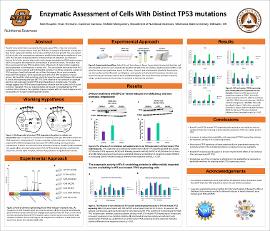| dc.contributor.advisor | Montgomery, McKale | |
| dc.contributor.author | Kouplen, Kate | |
| dc.contributor.author | Hermann, Evan | |
| dc.contributor.author | Cardona, Cameron | |
| dc.date.accessioned | 2022-05-12T12:40:30Z | |
| dc.date.available | 2022-05-12T12:40:30Z | |
| dc.date.issued | 2022-04-15 | |
| dc.identifier | oksd_Wentz_2022_kouplen | |
| dc.identifier.citation | Kouplen, K., Hermann, E., Cardona, C., & Montgomery, M. (2022, April 15). Enzymatic assessment of cells with distinct TP53 mutations. Poster session presented at the Oklahoma State University Wentz Research Scholars Symposium, Stillwater, OK. | |
| dc.identifier.uri | https://hdl.handle.net/11244/335697 | |
| dc.description.abstract | The p53 transcription factor, encoded by the human gene TP53, is the most commonly mutated gene in human cancers. Once the TP53 gene is mutated, p53 proteins not only lose their tumor suppression abilities but can also contribute to tumor growth. One-way mutant p53 can do this is by increasing iron uptake and availability by altering the regulation of ironsulfur (Fe-S) cluster containing proteins. Understanding such alterations are important because Fe-S cluster proteins play a role in both energy metabolism and DNA repair enzymes, which can suppress the progression and expansion of cancerous tumors. This study's main focus was to examine how TP53 mutation status influences Fe-S cluster protein regulation, and subsequently iron homeostasis in tumor cells. First, we assessed the activity of the Fe-S containing enzymes cytosolic and mitochondrial aconitase in cell lines expressing a variety of TP53 mutations. Specifically, we will use cell lines that express the six most commonly observed TP53 mutations, which represent nearly 25% of all TP53 mutations in human cancers. We found that while aconitase activity decreased as expected following the removal of iron in cells expressing wild-type (WT) TP53, the influence of iron chelation on aconitase activity in cells expressing mutant TP53 varied depending on mutation type. This data strongly suggests that TP53 mutations significantly influence how the activity of Fe-S cluster enzymes is regulated. Thus, our ongoing studies are focused on investigating how TP53 mutation status influences the regulation of genes involved with Fe-S cluster biogenesis and consequently, Fe-S cluster containing protein activity. | |
| dc.description.sponsorship | Lew Wentz Foundation | |
| dc.description.sponsorship | National Science Foundation (U.S.) | |
| dc.description.sponsorship | National Institutes of Health, National Cancer Institute | |
| dc.format | application/pdf | |
| dc.language | en_US | |
| dc.publisher | Oklahoma State University | |
| dc.rights | In the Oklahoma State University Library's institutional repository this paper is made available through the open access principles and the terms of agreement/consent between the author(s) and the publisher. The permission policy on the use, reproduction or distribution of the article falls under fair use for educational, scholarship, and research purposes. Contact Digital Resources and Discovery Services at lib-dls@okstate.edu or 405-744-9161 for further information. | |
| dc.title | Enzymatic assessment of cells with distinct TP53 mutations | |
| osu.filename | oksd_Wentz_2022_kouplen.pdf | |
| dc.description.department | Nutritional Sciences | |
| dc.type.genre | Poster | |
| dc.type.material | Text | |
| dc.type.material | Image | |
| dc.subject.keywords | TP53 | |
| dc.subject.keywords | iron homeostasis | |
| dc.subject.keywords | Fe-S cluster | |
